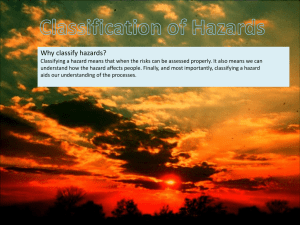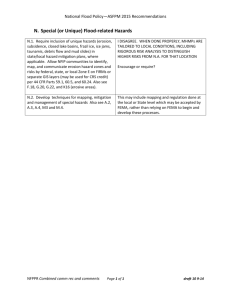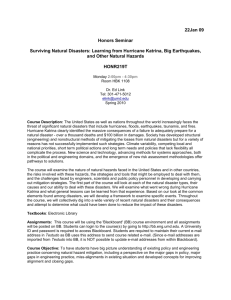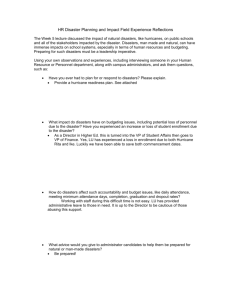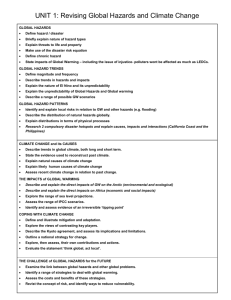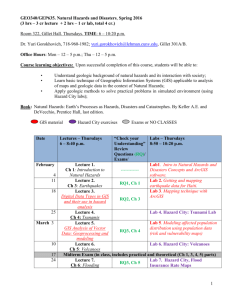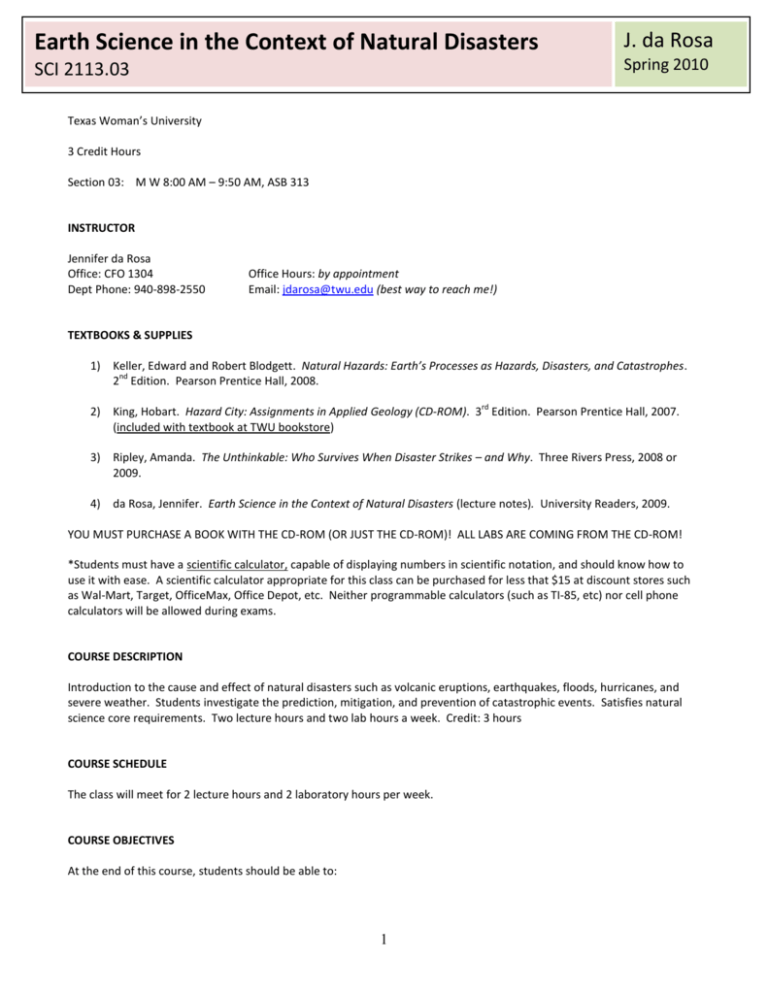
Earth Science in the Context of Natural Disasters
J. da Rosa
SCI 2113.03
Spring 2010
Texas Woman’s University
3 Credit Hours
Section 03: M W 8:00 AM – 9:50 AM, ASB 313
INSTRUCTOR
Jennifer da Rosa
Office: CFO 1304
Dept Phone: 940-898-2550
Office Hours: by appointment
Email: jdarosa@twu.edu (best way to reach me!)
TEXTBOOKS & SUPPLIES
1) Keller, Edward and Robert Blodgett. Natural Hazards: Earth’s Processes as Hazards, Disasters, and Catastrophes.
nd
2 Edition. Pearson Prentice Hall, 2008.
rd
2) King, Hobart. Hazard City: Assignments in Applied Geology (CD-ROM). 3 Edition. Pearson Prentice Hall, 2007.
(included with textbook at TWU bookstore)
3) Ripley, Amanda. The Unthinkable: Who Survives When Disaster Strikes – and Why. Three Rivers Press, 2008 or
2009.
4) da Rosa, Jennifer. Earth Science in the Context of Natural Disasters (lecture notes). University Readers, 2009.
YOU MUST PURCHASE A BOOK WITH THE CD-ROM (OR JUST THE CD-ROM)! ALL LABS ARE COMING FROM THE CD-ROM!
*Students must have a scientific calculator, capable of displaying numbers in scientific notation, and should know how to
use it with ease. A scientific calculator appropriate for this class can be purchased for less that $15 at discount stores such
as Wal-Mart, Target, OfficeMax, Office Depot, etc. Neither programmable calculators (such as TI-85, etc) nor cell phone
calculators will be allowed during exams.
COURSE DESCRIPTION
Introduction to the cause and effect of natural disasters such as volcanic eruptions, earthquakes, floods, hurricanes, and
severe weather. Students investigate the prediction, mitigation, and prevention of catastrophic events. Satisfies natural
science core requirements. Two lecture hours and two lab hours a week. Credit: 3 hours
COURSE SCHEDULE
The class will meet for 2 lecture hours and 2 laboratory hours per week.
COURSE OBJECTIVES
At the end of this course, students should be able to:
1
Earth Science in the Context of Natural Disasters
J. da Rosa
SCI 2113.03
Spring 2010
Earth Science and Natural Hazard Objectives
Distinguish between natural hazards and disasters
Understand the scientific method and be able to apply it to the study of natural hazards
Comprehend Earth as a system and describe how one natural hazard is linked to another
Decipher the many techniques used to measure, assess, and predict earth processes and hazards
Appreciate the scale and timeline of earth processes
Comprehend the earth processes that cause natural hazards
Illustrate the interconnectedness of many natural hazards
Relate various case studies of past natural disasters and their effect on society
Identify human activities that exacerbate natural hazards
Identify human activities that are successful adaptations to natural hazards
Understand how global issues like population growth, poverty, disease, and conflict can be intensified by the
effects of earth processes and vice versa
Make predictions about earth processes and their effect on the environment, society, and biodiversity
Explore innovative methods to cope with natural hazards
Use critical thinking skills to solve problems related to natural hazards
SENCER (Science Education for New Civic Engagements and Responsibilities) Objectives
Apply scientific methods and principles to address civic issues
Identify the advantages and limitations of modern science relative to society
Relate knowledge of earth science to current environmental/political/public issues
Demonstrate how the magnitude of disaster destruction is influenced by a society’s awareness/education,
economy, decision making, building design, population density, landuse practices, and overall culture
Explore the effectiveness of human activities intended to minimize natural hazards
Identify ways in which community actions can improve natural hazard awareness, prevention, preparation, and
response
Acquaint students with the American Red Cross’ mission regarding disaster preparation and response
Instruct students on how to gather observations regarding severe weather and report data to the National
Weather Service
COURSE REQUIRMENTS
Lectures: Attendance is required for satisfactory performance on exams. All information presented in the lectures will be
covered on the exams.
Lecture Exams: There will be three exams given throughout the semester. The content of each test is further detailed in
your Lecture Schedule. Each exam will be comprehensive of the new material covered up to that point. All students must
take examinations at the scheduled time.
Reading Assignments: Assigned chapters from Amanda Ripley’s The Unthinkable: Who Survives When Disaster Strikes –
and Why will complement and enhance lecture topics throughout the semester. Readings relate disasters to human
behavioral response, working to answer the inevitable question: “What would I do in a disaster?” Any material mentioned
in Ripley’s book is likely to be further discussed/debated in class, and the content will be included on lecture exams.
Hazard City Exercises: Lab exercises will be completed using the Hazard City CD-ROM and will parallel and support lecture
topics. Hazard City exercises will be submitted using Blackboard’s Turnitin feature. LATE WORK IS NOT ACCEPTED (but
early work is accepted!). You can turn in work early to Blackboard once the Turnitin assignment button has been posted.
Special Training: Students will complete several disaster training programs this semester and attend occasional guest
lectures throughout the semester. Attendance is required at all disaster training and guest lectures, and students will
2
Earth Science in the Context of Natural Disasters
J. da Rosa
SCI 2113.03
Spring 2010
receive a grade for completion. Special training this semester will include (but is not limited to): 1) An instructor for the
American Red Cross (ARC) Dallas Chapter will conduct the first course in ARC’s Disaster Training series: Fulfilling Our
Mission. This will be scheduled during class time. 2) In addition, students are required to attend the SKYWATCH Storm
Spotter training hosted by the National Weather Service (both Basic and Advanced) on Saturday, Feb 27. The training will
take place in the MCL Auditorium on campus: 9 am to 12 pm (basic training) and 1:30 pm to 4 pm (advanced training). 3)
Attendance is also required for any guest lecturers from the Federal Emergency Management Agency or the City of Denton
Office of Emergency Management. Guest lectures are usually scheduled during regular class time.
Civic Engagement: With education comes responsibility; so it is appropriate to use our knowledge to serve the community
in which we live. Therefore, a portion of the credit in this course is earned by engaging in TWO volunteer activities related
to the environment and/or emergency preparation and response. This could be a group or class project to benefit the
campus or Denton community, or individual work… to be discussed and agreed upon early in the semester. More
information will be posted in Blackboard as these opportunities become available. These activities will typically require 4-6
hours of time spent outside of class per activity, proof of volunteer work, and a 1-2 page written report about what you did,
what you learned, and whether it was worthwhile.
GRADING POLICY
Exam 1
Exam 2
Exam 3
Hazard City Exercises
Special Training
Civic Engagement
20%
20%
20%
20%
10%
10%
100%
GRADING SCALE
A = 90 to 100
B = 80 to 89
C = 70 to 79
D = 60 to 69
F = < 60
METHODS OF INSTRUCTION
The lecture/note-taking method of instruction is utilized. Course content is reinforced using multi-media, PowerPoint
presentations, animations, satellite imagery, photography, graphics, maps, journal articles, and DVD/videos.
ATTENDANCE POLICY & MAKE-UP WORK
A class sign-in sheet will be passed around each time you come to class. You must sign the roll to be counted present and
to receive credit for any lab experiments performed in class. Please note that students who are frequently tardy or absent
from class usually have difficulty keeping up.
Exams, homework, and lab exercises cannot be made up. Therefore, I expect you to come to every lecture and lab and
participate completely. If you choose to miss a class for reasons other than a documented medical emergency, death in
3
Earth Science in the Context of Natural Disasters
J. da Rosa
SCI 2113.03
Spring 2010
family, or participation in military duties, you will receive a grade of zero (0) for all work due that day— including any
homework, exams, presentations, or lab exercises.
In order to be considered excused from any lecture or lab, you must inform me in writing or by email before class, and you
must submit your medical/legal documentation to the Student Life Office (940-898-3615). Please note that you are allowed
only one week to make up a homework/lab from an excused absence. If the work is not made up within that time frame,
you will receive a grade of zero. Please note, lab exercises that require setup, or that involve videos, cannot be made up.
No make-up exams will be given under any circumstance. If a student misses an exam for an excused absence
(documented medical emergency, death in family, or participation in military duties) as approved and validated by the
Student Life Office, the lowest of the two other exam grades will be used to replace the missed exam (this will only happen
once, all other excused absences on exams will be recorded as a zero). If the absence is not excused by the Student Life
Office, then the score will be recorded as a zero. Your instructor cannot excuse an absence. No, you cannot take an exam
early.
EXAM ADMINISTRATION
Scheduled exams will be given promptly at the beginning of class. Students are expected to be on time for announced
tests. On exam days:
No one will be allowed to enter the classroom later than ten minutes after class begins.
All test papers must be handed in at the end of the scheduled testing time.
All personal belongings will be placed at the front of the classroom prior to exam commencement.
No cell phones, pagers, or programmable calculators on exams – if your phone/pager rings, vibrates, etc. during
an exam, your paper will be taken up immediately, and your grade will suffer accordingly.
Food and drink is strictly prohibited during exam time.
Absolutely no iPods, headphones, or earbuds will be allowed on exam day.
If your ears are concealed by clothing (i.e. hat or earmuffs), you must remove the article prior to exam time.
BLACKBOARD
This course will utilize online support from the Texas Women’s University Blackboard (Bb). Various course documents will
be available to students: syllabus, homework, learning outcomes, group emails, group discussions, grades, feedback,
announcements, etc. You can access Blackboard from either the TWU homepage: www.twu.edu, or your Portal page. (You
may also go to twu7.blackboard.com) On the bottom left of each, there is a Blackboard button. Click on it and log in by
using your Portal username for both the login and the password. Once you have successfully logged-in, click on Personal
Information on the upper left side of the page and complete your user information, especially your email address. Finally,
change your password to something other than your Portal username. Look for announcements that may be posted and
explore the program to become familiar with the different menu options.
ACADEMIC INTEGRITY
Honesty in completing assignments is essential to the mission of the University and to the development of the personal
integrity of students. In submitting graded assignments, students affirm that they have neither given nor received
unauthorized assistance, and that they have abided by all other provisions of the Code of Conduct in the TWU Student
Handbook. Cheating, plagiarism, fabrication or other kinds of academic dishonesty will not be tolerated and will result in
appropriate sanctions that may include failing an assignment, failing the class, or being suspended or expelled. Suspected
cases in this course may be reported to Student Life. The specific disciplinary process for academic dishonesty is found in
4
Earth Science in the Context of Natural Disasters
J. da Rosa
SCI 2113.03
Spring 2010
the TWU Student Handbook. The TWU library link, “Avoiding Plagiarism,” will aid students in completing their assignments
with integrity.
In an effort to ensure the integrity of the academic process, Texas Woman’s University vigorously affirms the importance of
academic honesty as defined by the Student Handbook. Therefore, in an effort to detect and prevent plagiarism, faculty
members at Texas Woman’s University may now use a tool called Turnitin to compare a student’s work with multiple
sources. It then reports a percentage of similarity and provides links to those specific sources. The tool itself does not
determine whether or not a paper has been plagiarized. Instead, that judgment must be made by the individual faculty
member. Some of the required assignments in this course may be checked for plagiarism using Turnitin.com.
FINAL EXAM SCHEDULE (day of Exam 3…)
th
Monday, May 10 , 8:00 AM – 10:00 AM, ASB 313
FYI
There is no extra credit (with the exception of any bonus questions on exams).
All cell phones, beepers, messaging systems, etc. should be set to silent during class and lab. It is not appropriate to leave
the classroom or lab to answer your phone or pager except in an emergency.
No food allowed in the classroom. However, you may have a drink in a closed container (i.e. soda, water bottle). No food
or drink allowed on exam days.
DISBILITY ACCOMODATIONS
If you anticipate the need for reasonable accommodations to meet the requirements of this course, you must register with
the office of Disability Support Services (CFO 106, 940-898-3835, dss@twu.edu ) in order to obtain the required official
notification of your accommodation needs. Please plan to meet with me by appointment or during office hours to discuss
approved accommodations and how my course requirements and activities may impact your ability to fully participate.
***PLEASE NOTE, THIS SYLLABUS IS SUBJECT TO REVISION AT ANY TIME, AND I WILL NOTIFY YOU OF ANY CHANGES.
5
Earth Science in the Context of Natural Disasters
J. da Rosa
SCI 2113.03
Spring 2010
-------------------------------------------------------------------------------------------------------------------------------------------RETURN SECTION
My signature below signifies that I have received through Blackboard, read, and understand the course information and
policies for SCI 2113 – Earth Science in the Context of Natural Disasters.
(Signature)________________________________________________________________
(Printed Name)_____________________________________________________________
Student ID Number ___________________________________
Date _______________________________________________
6

